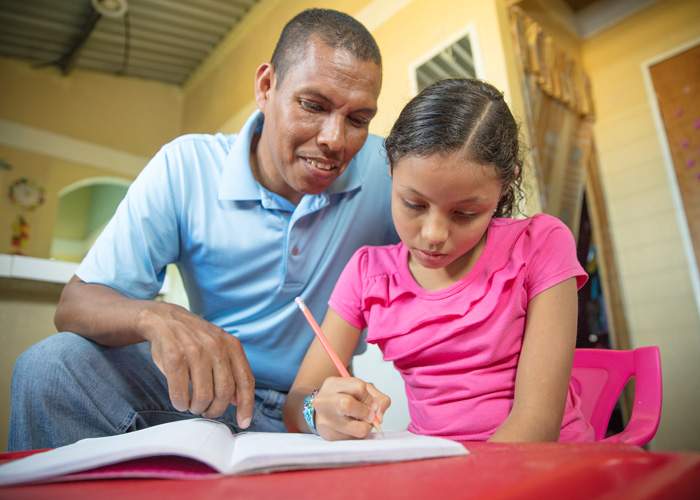Proper shelter is the foundation on which families and communities thrive. Better, affordable living conditions lead to improved health and stronger childhood development and give families the ability — and financial flexibility — to make forward-looking choices. This is one thing José knows for sure.

José is the father of two young girls and is a math teacher to many students at the public high school in Santa Cruz, Honduras. Both roles require that he lead an exemplary life, he says. “Part of setting an example is providing your family with a secure place to live.”
He wants to teach his daughters, 10-year-old Génesis and 6-year-old Madelyn, that a home is where families bond and grow strong together, he says, where children flourish in body and spirit. He wants to teach his students that the equation for success is hard work, perseverance and responsibility.
For a long time, José and his wife, Martha, struggled to figure out the path to homeownership. In Santa Cruz, land is in high demand and short supply. “There were people with land, but it was very expensive,” José says. “With what I earn, if we could have somehow gotten the land, we wouldn’t have had enough money to build a home.”
They eventually discovered the answer to their problem. Habitat’s global advocacy campaign, Solid Ground, helps countries like Honduras address housing problems through advocacy that mobilises people and influences laws and policies. In just over a year, Solid Ground already has taken root in 30 countries and has helped an estimated 1.3 million people gain access to land for shelter.
Habitat Honduras, for example, has been at the centre of local and regional advocacy efforts, facilitating relationships with local municipalities, which have relative autonomy on housing issues, and diagnosing local and regional housing needs in order to better develop locally tailored policies. And those advocacy efforts are paying off.
More than half of Honduras’ 298 municipalities have passed housing policies, and the goal is to have the rest put policies in place by 2018. A study of 102 municipalities where this methodology had been implemented showed a total increased investment of US$40,849,897.14 — an average of 5.36 percent of the municipal budget — benefiting 106,420 families.
It was through the efforts of Habitat Honduras and other community partners that the city of Santa Cruz adopted a housing policy aimed at helping families afford stable and decent homes. The city might acquire land, offer financial assistance, waive building permit fees, contribute construction materials and labour, put in roads, or provide access to water and other services. It works with Habitat, private businesses and other partners to increase opportunities for affordable housing.
Through this collaboration, José and Martha were able to buy a Habitat home four years ago. José smiles when talking about life in the house, which is decorated with family photos, school diplomas marking the girls’ progress from grade to grade, and artwork that Martha makes from glass bottles and other materials that she recycles. The younger daughter, Madelyn, is artistic like her mom, while Génesis is good with numbers like her dad.
“I remember when my wife used to ask me, ‘When are we going to have our own home? I want to watch our daughters grow up in a home that is ours,’” José says. “I am smiling because she has her dream.”
Teaching algebra and trigonometry at the high school only has reinforced for José how important a stable home is to a child’s academic and future success. Many of his students come from poor families that are constantly changing apartments to afford the rent. He has noticed that when some of those students finally move into a stable housing situation, their grades improve and they are more confident, making it more likely that they will lead lives of example.
While José is a father and a teacher, he also sees himself as a builder of sorts. “I am pouring the foundation for the future,” he says.